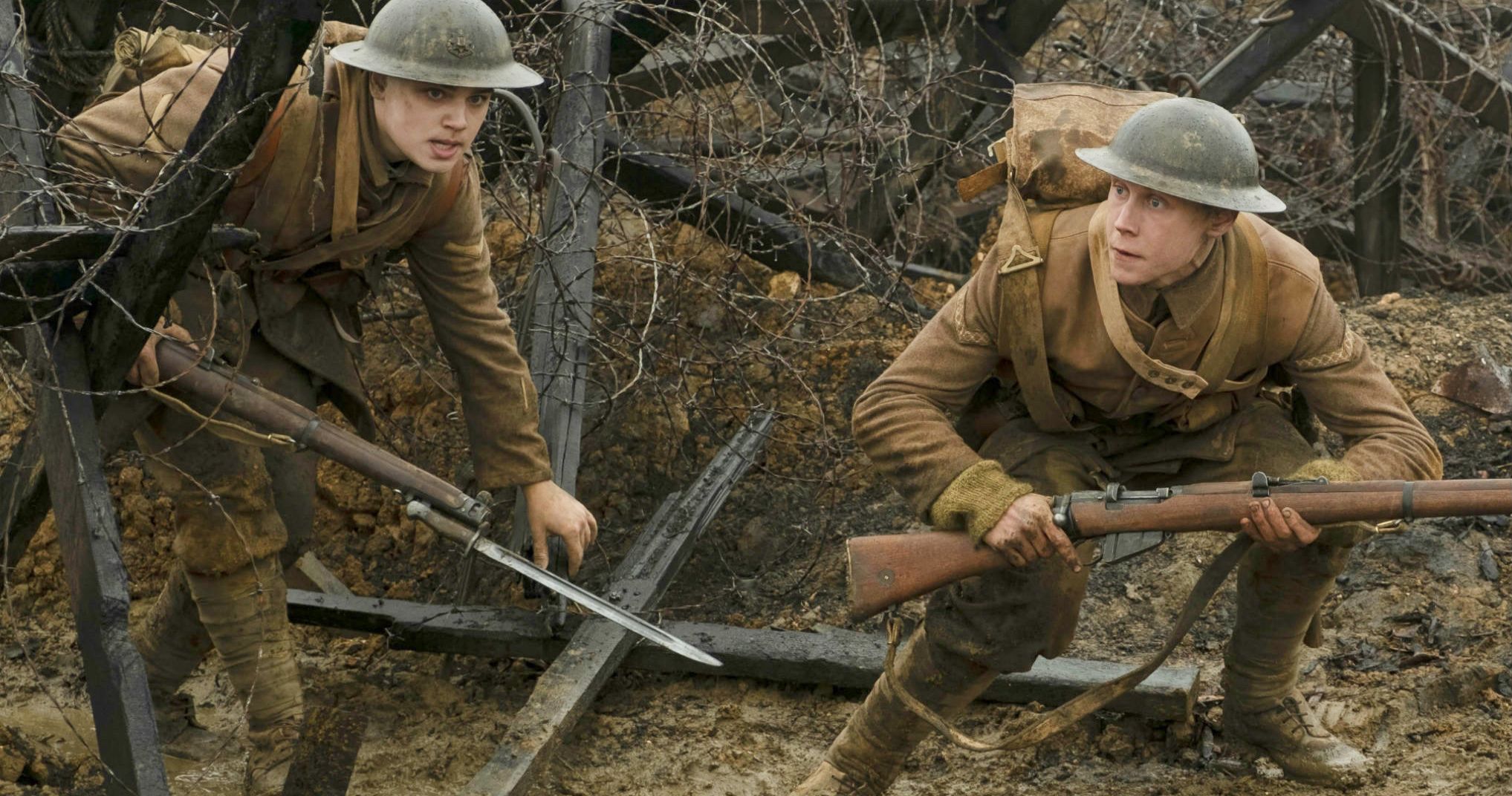1917 is an astonishing cinematic achievement. Director Sam Mendes and cinematographer Roger Deakins elevate filmmaking artistry through technical brilliance and old fashioned, gritty storytelling. 1917 takes place at the height of World War I. The entire film is seen as one continuous camera shot. Every aspect of 1917 works in concert to be powerfully immersive. It is a fluid, riveting experience that utterly grips with stark realism. It is the clear Oscars front runner for best film of the year.
On April 6, 1917, in a muddy British trench near the frontline in France, Lance Corporals Blake (Dean-Charles Chapman) and Schofield (George MacKay) are summoned for an urgent mission. The general (Colin Firth) briefs them with new intelligence on German troop movements. The enemy has retreated, but heavily refortified their positions. An overeager British colonel (Benedict Cumberbatch) launches an offensive the next morning. He's heading into a trap.
Blake and Schofield must leave the trench, cross "No Man's Land", and traverse German occupied towns to deliver the general's orders. The mission is critical to Blake. His older brother (Richard Madden) is a lieutenant on the frontline. The daring soldiers thrust boldly into certain death. They must reach the colonel in time. Thousands will be massacred if they fail.
The no edit viewpoint is unlike anything you have seen in a movie. Blake and Schofield's journey takes place over a day and night, but feels like real time. You watch as they rush through seemingly endless, filthy trenches filled with injured men and broken spirits. They slog through muddy bogs, strewn with animal and human carcasses being devoured by ravenous rats. And that's just the beginning. The real dangers await in the devastated fields and towns that lay before them. 1917 spares no details of the carnage. You're with Blake and Schofield for every second. The enormity and urgency of the mission like a knife at their throats.
Oscar winners Sam Mendes (American Beauty, Skyfall) and Roger Deakins (No Country for Old Men, Blade Runner 2049) do not allow the technical wizardry to supplant the plot. 1917 uses the no edit visual effect as a vital tool in telling the story. The film is an homage to Mendes' grandfather, who told him of the hardships and sacrifices made during the bloody war. Blake and Schofield embody the courage and conviction that the average man had to muster to survive. There are heartbreaking, gut-wrenching scenes of loss, camaraderie, and kindness. 1917 is the perfect example of expert collaboration. An epic story is brought to life without conceit.
The filmmakers use a variety of methods to enthrall. The continuous take deserves acclaim, but doesn't stand alone. The haunting, beautiful score by Thomas Newman (The Shawshank Redemption, Road to Perdition) is essential to establishing tension in the film. When Blake and Schofield navigate dark, dangerous places, the music slowly builds to nerve-wracking fright. One scene in particular, of a British soldier singing to his weary men in a forest, will stir your soul. It is a reminder that even in the midst of hell, there can be moments of beauty.
1917 could not be told without the incredible performances of its two lead actors. We see the film through Blake and Schofield's eyes. Dean-Charles Chapman and George MacKay inhabit their characters flawlessly. Where Blake is gung-ho and inexperienced, Schofield is older, more cautious. Their relationship dynamics illustrate the selflessness needed to carry on such an impossible objective. George MacKay, a relatively unknown British actor, carries the weight of 1917. He becomes a star in this film.
There are not enough superlatives to describe 1917. Sam Mendes had already reached the pinnacle of his craft with American Beauty. He attains greatness again. 1917 is quite simply, a masterpiece. See it in the best theater possible. 1917 is a production of Dreamworks Pictures and Amblin Partners with distribution by Universal Pictures.

